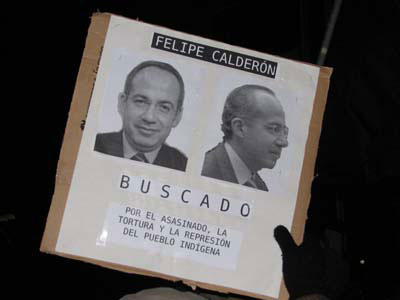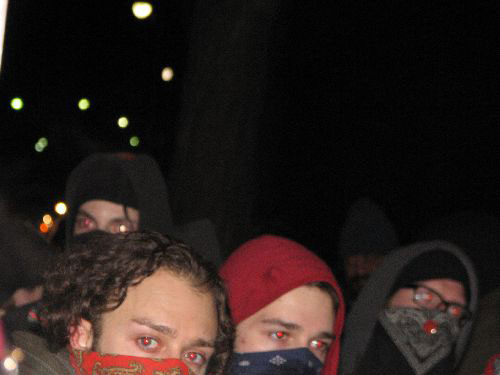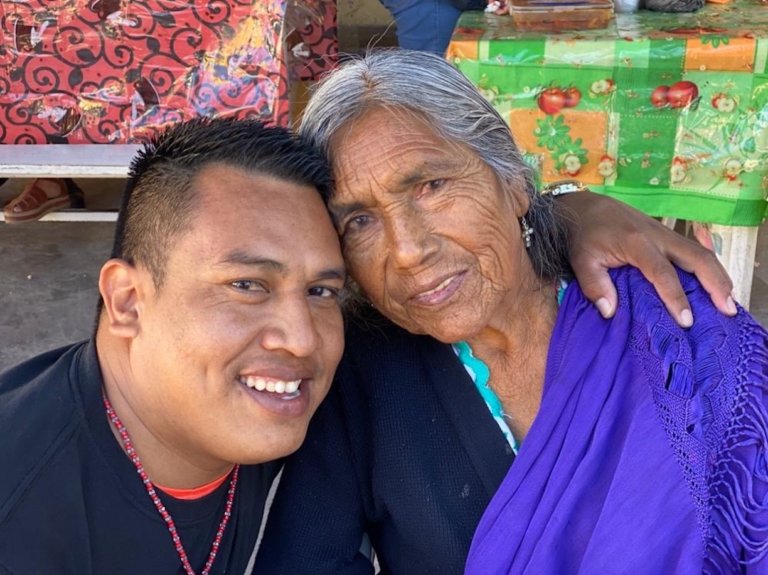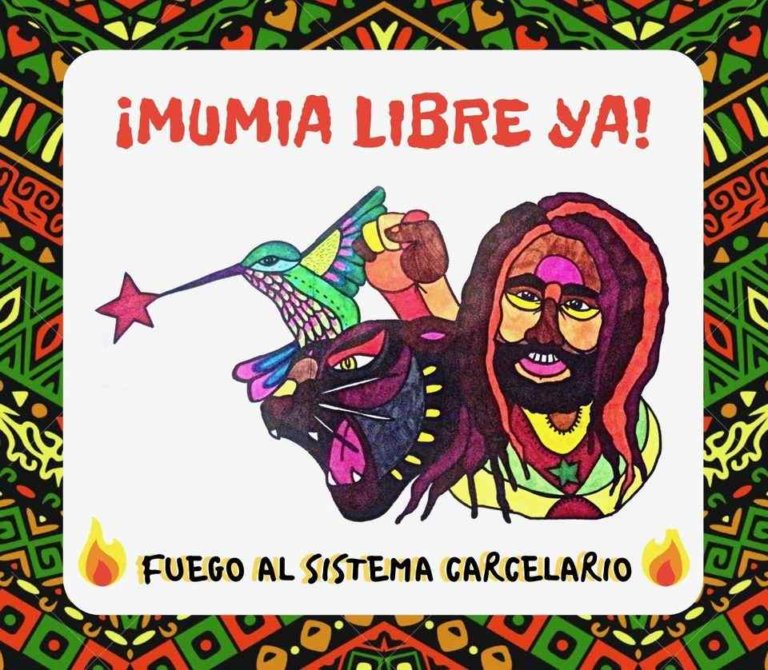February 12th, 2008: Cambridge, Mass — A group of protesters unveiled their banners and signs in freezing temperatures last night to greet President of Mexico Felipe Calderon who spoke at Harvard’s JFK Forum. “Boston doesn’t appreciate visits from those who violently suppress Indigenous movements and work to create desperate economic conditions that force millions of their citizens to migrate in search of better lives,” read a press release that the Zapatista Bloc circulated previous to the protest. The bloc is formed by a group of local anarchists who value indigenous rights of self-governance, but many other Boston activists were present at the rally as well.
At the forum Calderon talked about his plans for investment and privatization of Mexico as a main focus for generating jobs. “The goal is to make Mexico the best place for foreign investment in the world,” he said. As a strong supporter of free trade agreements like NAFTA and Plan Puebla Panama, Calderon wants to develop infrastructure from “coast to coast” and apply a strong hand (ie, through the national armed forces) to accomplish the stability required for foreign investment. “There are a lot of investors who are looking for a safe place to invest,” he said.
Unfortunately, the biggest investor in Mexico, the United States, is seeking to help control the region by pumping it with a $1.4 billion military aid package over the next three years, to be debated on in the U.S. Congress. Such aid, which includes counterinsurgency training, is said to be to fight the war on drugs, but the U.S.-sponsored militarization of Latin America is well-known for its brutal after effects, particularly among corrupt armed forces.
“If you see dust in the air, don’t mind us, we’re cleaning the house,” said Calderon referring to war on crime in his country. However, critics of Calderon’s short tenure say that his strong-hand tactics will likely overrun the rights of Mexico’s poorest, particularly in indigenous-populated areas in the south. One of the protesters last night, Bryan O’Connell, an Equal Exchange staff member who just came back from visiting Chiapas, was shocked to witness the kind of repressive politics in the region. “Paramilitaries are acting out in the open, particularly in the last 2-3 months,” he said.
An indigenous autonomous region, Chiapas has tried for more than a decade to settle an agreement with the Mexican government to safeguard their rights for self-governance. Zapatistas negate the classic capitalist neoliberal ideals affirming that it is not a sustainable system and would like a chance to practice their own indigenous social values through collective decision-making and a better coexistence with nature.
Yet, the indigenous claim is seen as a threat to the established powers who benefit from absolute control of the region for the exploitation of its natural resources. According to the Zapatista mobilization in Chiapas, four communities were forcefully displaced in August 2007 from the biological reserve they had been set up to protect, Montes Azules en la Selva Lacandona. Since September, members of the Bolon Ajaw community have been threatened and harassed, including the setting of fire of several homes, by the paramilitary force active in the region, the OPDDIC. In December and January, three activists were targeted and shot by members of the same group, two of them (Eliseo Silvano Jiménez and his son Eliseo Silvano Espinoza) were subjected to torture while in detention.
The collision between these two worlds has historically been a violent one, which today is eminent in the show of force in Oaxaca and Chiapas led by Calderon’s military. The indigenous of the Americas have always been seen as a threat to the system, yet the most recent influx of tourism has happened, ironically, because of its people’s unique vision of the world.
In Oaxaca, thousands tried to make proposals for better government—a government less prone to corruption—but have been met consistently with state repression led by the state’s governor Ulises Ruiz. In the past two years many have died and many others remain illegally detained. One such activist who was detained in clashes with the police in Oaxaca last year, David Venegas Reyes “Alebrije”, wrote from jail:
“In Oaxaca, a state whose regions are inhabited by sixteen Indian nations, dispersed in ten thousand communities, a state in which we city dwellers are descendants and heirs to this Mesoamerican Civilization, autonomy is a reality in many towns and villages. It takes the form of self government based on traditional customs and practices. Although it is limited by the government and the political parties and attacked by the same forces, it is possible to observe autonomy in practice in many indigenous and mestizo communities, where it stands as an example of what may be viable for our society as a whole in the future.”
Indeed, the same people seeking peace in the region claim that their world does not need to be set against the government’s agenda if such sincerely includes, a unified Mexico in all its diversity.
Calderon’s promises at Harvard’s JFK Forum indeed seemed inclusive of many progressive ideals including universal health care, a safer immigration policy at both the northern and southern borders, low-interest loans for micro businesses, social security for those working in the informal market, better relations with Latin American countries, including Venezuela and Boliva, and an environmental agenda that’s inclusive of the Kyoto Protocol.
Many argue that his ideals of economic growth through free market policies will sweep the most vulnerable in a continent where indigenous peoples have been denied for centuries their right to life, Zapatista-style. It also remains to be seen how civil society in Mexico reacts if NAFTA-plus is implemented. On January 31 as many 300,000 protesters marched the streets of Mexico city to demand a renegotiation of the free trade agreement to guarantee certain trade protections against agricultural items like corn, which can’t compete against the heavily subsidized items flooding from the United States and Canada. Free trade agreements have been known to benefit big companies while undermining local labor and environmental laws. NAFTA has been largely blamed for forced migration to the north and the loss of jobs in rural areas, coupled with an invasion of maquiladoras that compete amongst themselves to offer foreign investors the least restrictions and lowest wages.
“It’s the same speech we’ve heard from PRI and PAN for decades,” complained a recently arrived immigrant from Mexico who was among the protesters at Harvard. He did not believe in Calderon’s promise for jobs because he said that in Sonora, where he is from, jobs have been disappearing since NAFTA took over. He himself was convinced he could make enough at his local maquiladora, where he left most of his friends, and made his trek up north.
The resistance against “free trade” is coming from all sectors of the Mexican civil society, but it started most definitely in the south. As early as 1994 the Zapatistas declared themselves unilaterally against NAFTA. Their ideals all of a sudden seem closer with Mexico’s hope for their future than Calderon’s vision of the same old Mexico.



See also:
chiapas.indymedia.org
Related stories on Boston Indymedia:
Call for a “Zapatista Bloc” to Greet President Calderón in Boston on 2/11
http://boston.indymedia.org/newswire/display/203479/index.php
—
source: http://boston.indymedia.org/feature/display/203561/index.php




Protesters Greet Calderon: Demand Human Rights for Indigenous Peoples
By citizen multi-galactica
Original adapted from post by Sofia Jarrin
nyc.indymedia.org/en/2008/02/94695.html